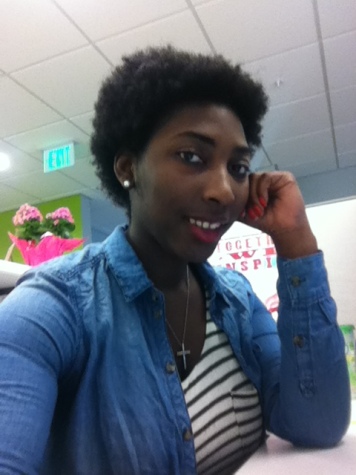 “It was by God’s grace that I got this job and I wasn’t going to let this hair He gave me mess it up.”
“It was by God’s grace that I got this job and I wasn’t going to let this hair He gave me mess it up.”
It’s funny because I have shared my natural hair journey with you before: I sawed off every permed hair in my head and began wearing my natural locks. It was a story of liberation. I was finally being “the me” I always envisioned, and my hair was the outer expression of what happened to me on the inside.
I was free.
Free from all the generational curses, societal norms and stereotypes that had been placed on me. I was graduating from college in a year and I would be taking on the world with my new hair and empowered attitude.
Then I graduated.
After looking and landing my first corporate job I realized, maybe I am not as free as I thought I was. Around the time of my interview I really needed to take my braids down. I had worn braids for 2 months and taking them down was overdue. I wore them to the interview anyway. What I then equated to lavish laziness, I later recognized as fear.
” I did not know what corporate America would think of my unrestrained curls.”
College was over, and all those thoughtful hippies and Sister Souljah types were no longer around to feed my ego. There was no one around me saying how cool and beautiful my curls are. India Arie’s “I Am Not My Hair” was no longer my imagination’s theme song.
All I could remember was how other Colored girls with natural hair who said they wore their hair straight for months, because when you’re the only person of color you have enough stereotypes in the office to battle.
I was so busy feeding into what everyone else said, there was no room to add what I thought on the plate. Bottom line, I was a mess; I was too scared to wear a twist out let alone an Afro puff. My natural tresses were supposed to enact freedom; instead I was more oppressed than ever.
So you’re probably wondering, how I got over it? I wish I had this triumphant epiphany to share, or a jubilant tale of a great voice coming from heaven, telling me, “Baby your gonna’ be alright”, but I don’t.
It was purely accidental.
One night my mom was too busy to braid my hair, so I went home and tried to curl my hair. The style turned out nice, but when I woke up the next morning, the curls went wrong. My hair was a disaster. Usually I was capable of fixing it but nothing seemed to work. I would need to start over to fix my hair. I hopped in the tub and washed my hair in the shower.
When I was finished, I looked in the mirror at my tight curly fro. With less than an hour to report to work, I had no choice but to wear an Afro. I looked in the closest for the most professional dress and heels I possessed because if I was going to wear my hair “like this” and keep my confidence, I was going to have to own it!
I remember walking into my office and feeling somewhat of a spectacle. I got a few look and stares, but I also received a few “I love its” and “Your gorgeous’”. I sat in my office and looked in the mirror close by and thought how good I looked and wondered why I took so long to do this. I was still professional and was probably earning a promotion since no one had to look at those two month old braids any longer!
I am still a work in progress. I don’t always overflow in confidence every day I rock my natural tresses. But now I know for sure that I wear my hair for me instead of basing my look on what others think. Corporate America is doing just fine with my unrestrained curls and so am I.
So I challenged you as I challenge myself daily to be brave, bold, and beautiful since God so graciously chose you to be kissed by the sun.





